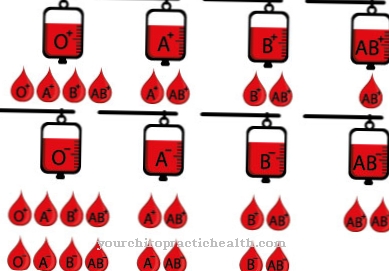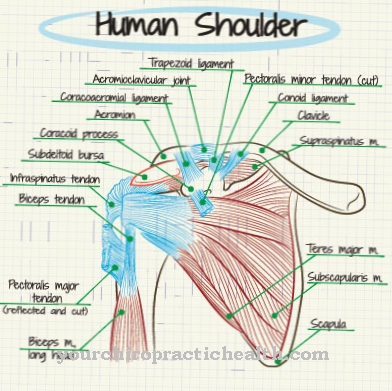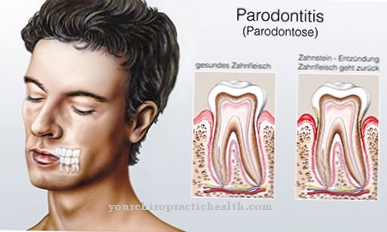A Drug addiction is a pathological dependence on a certain substance. This cannot be controlled by the person concerned or can be ended without further ado. The triggering substance can be heroin, cocaine, alcohol or medication. Drug addiction damages the body and mind of the person affected and is potentially fatal.
What is a drug addiction?

© daoduangnan - stock.adobe.com
Experts understand the term drug addiction to be a pathological dependence on one or more substances. Alcohol, medication or illegal drugs such as heroin, cocaine or even marijuana can trigger drug addiction if they are used repeatedly.
At first, those affected are usually not aware that they are addicted and / or do not want to admit it to themselves. The consumption of the respective substance causes an extreme feeling of elation or deep relaxation and represents a temporary escape from reality, which must be repeated after the respective feeling has subsided.
The victim cannot control this desire and may be willing to commit criminal acts in order to obtain the substance. A drug addiction generally requires medical and psychological treatment, as it seriously damages the body and psyche of the person concerned.
causes
Despite intensive research, science has not yet been able to clearly identify which factors lead to the development of drug addiction. However, it has been found that it is likely a combination of biological, social, and psychological components that will eventually create addiction.
The prejudice that especially people from socially difficult circumstances take refuge in drugs cannot be confirmed in this way. It is true that there are people who want to escape their poverty and deprivation life with the help of drugs; but also often wealthy or even famous people tend to resort to drugs.
Drug addicts can therefore be found in all social classes, regardless of age, gender or individual personality structure.
Symptoms, ailments & signs
With an existing drug addiction, a wide variety of symptoms and complaints can occur, which can be very different depending on the type of drug. A typical symptom is a significant lack of concentration, so that an affected person with an existing drug addiction cannot perform consistently well. In many cases there is also a prolonged tremor of the hands, which persists especially during intoxication.
Another and at the same time very pronounced sign of drug addiction is an unkempt appearance. Drug addicts are severely affected by regular drug use. The corners of the mouth tear, damaged teeth, blemished skin and red eyes are clear signs of drug addiction. In addition, drug addiction can also lead to various underlying diseases.
Permanent damage to the kidneys, liver and brain is not uncommon. In general, it is always advisable to consult a doctor if there is an existing drug addiction so that therapy can be carried out quickly and smoothly. Otherwise, drug addiction can even lead to death if all signs and symptoms are ignored.
diagnosis
Drug addiction is diagnosed using psychological and medical tests. A conversation with the person concerned can also provide information; however, drug addicts tend to deny and hide their addiction.
Since the consumption of the various substances affects both the psyche and the body, the treating doctor can use blood tests, hair samples or ultrasound examinations to determine whether there is a drug abuse. Psychological failures or impaired consciousness can also mean the presence of an addiction.
A drug addiction must always be treated, otherwise it will take on ever stronger forms and thus affect the person affected in social, psychological and physical terms. Since the body is permanently damaged, it can be potentially fatal if left untreated.
Complications
In the worst case scenario, drug addiction can lead to death. This is especially true if the drug in question is taken in an overdose or if the organism has been severely damaged by long-term drug use. In most cases, drug addiction destroys the immune system.
Drugs have a negative effect on the heart, liver, kidneys, and stomach and can cause problems in these organs. Drug addiction destroys nerves, which can lead to perception disorders, which occur primarily in the extremities. The brain is also affected by drug addiction.
This can lead to thought disorders and retardation. As a rule, the damage caused by drug addiction cannot be reversed. There are also strong psychological problems. These can have a negative impact on friendships and other social contacts.
Often those affected become aggressive when the drug is not taken and are also ready to act violently. Treatment of drug addiction is usually possible in the form of withdrawal. However, the patient has to admit that he suffers from drug addiction. Withdrawal leads to success in most cases. However, drug addiction can recur in the course of life.
When should you go to the doctor?
A drug addiction must always be treated by a doctor or an appropriate therapist, as the person concerned cannot cope with an existing drug addiction alone. Of course, the type of drug plays a very important role.
If the person concerned is addicted to a hard drug such as heroin or cocaine, there is even an acute risk of death. Especially if the existing addiction remains without any treatment, then the drug addiction can even lead to death. However, if the affected person decides to have treatment, then this is definitely the way to go and it is also very important.
The chances of a full recovery are only guaranteed if treatment is promptly provided. However, if the person concerned forego therapy or treatment, then the prospect of self-healing looks anything but good.
Only very rarely do drug addicts manage to get out of such a crisis themselves, so that appropriate therapy is essential. For this reason, the following applies: Anyone suffering from drug addiction must not put off therapy and treatment. A quick and complete recovery is only guaranteed through professional therapy.
Doctors & therapists in your area
Treatment & Therapy
If a drug addiction has been clearly diagnosed, the treating doctor initiates therapy. This takes place in an inpatient clinic and consists of different components.
First of all, there is a withdrawal or detoxification. Under medical supervision, the addictive substance is withheld from the patient. The withdrawal symptoms that occur can be alleviated with medication. Then the so-called weaning can begin. During this phase, which can last up to a year, the patient learns to live a life without the drug. Intensive psychological discussions take place, which often also include family and partner.
Finding out the individual trigger of the addiction disorder can make a decisive contribution to avoiding a relapse later on. A rehabilitation phase helps those affected to find their way back to everyday life, for example to find an apartment and a job, and to establish social contacts.
Drug addicts generally have a high risk of relapse, which is why it is not uncommon for several therapies to be completed before permanent abstinence can be achieved. The potential risk of relapse is lifelong.
Outlook & forecast
Most addicts cannot get rid of drug addiction without professional help. The chances of deciding on your own not to want to take drugs any more and of sticking to this decision are extremely slim. With professional support, however, there are quite a few former drug addicts who no longer need drugs today. The relapse rate is still high and there are ways and means to stay drug-free after successful therapy.
The first step in improving the prognosis of drug addiction is accepting professional help in whatever form is necessary. For some drugs, a visit to a psychotherapist or even a family doctor is enough - light or legal drugs such as cigarettes can be banished from life in this way. Self-help groups are also helpful in helping people with drug addiction to cope with life without drugs in the long term.
In the case of severe drug addiction or hard drugs, referral to the withdrawal clinic is usually recommended as an immediate measure, followed by cold withdrawal or a substitute drug such as methadone. Drug addiction in and of itself will last a lifetime, it cannot go away. It is all the more important to enable former drug addicts to stop consuming drugs through suitable long-term measures. The chances of success depend largely on the addict's motivation, his social environment and the support he receives on his way.
prevention
Drug addiction can only be prevented to a limited extent. If an affected person notices the first signs of addiction or if friends or family notice the corresponding symptoms, a counseling center should be sought in case of doubt. These help free of charge and anonymously if desired on the difficult path to a drug-free life.
You can do that yourself
The possibilities for self-help measures in everyday life in the case of an existing and ongoing drug addiction are limited. This is different in the phases of withdrawal and abstinence.
For example, those affected who pursue their addictive behavior are not to be expected to develop avoidance strategies in everyday life, as the addiction largely takes away control of their actions. This varies greatly depending on the substance used and the amount. The only attempt can be made to influence those affected from the outside and to get them to recognize their addiction and to take the necessary steps that aim at withdrawal.
Strategies such as hiding or disposing of substances from the environment of those affected are hardly helpful and at most lead to aggression or despair. Cold withdrawal is not possible with all drugs.
Talking to friends and family members during withdrawal can help. Newly discovered activities distract from withdrawal symptoms and open up new perspectives for those affected. It may be that in the course of this, a compensatory behavior develops through excessive exercise of an activity.
The abstinence depends on the person concerned avoiding opportunities to fall back on their old consumer behavior. This can also mean the (temporary) renouncement of social events (alcohol, cigarettes). Those affected should also have a job. Exercise, hobbies, and cooking, for example, can help you get through withdrawal and abstinence better.




.jpg)
.jpg)


















.jpg)



